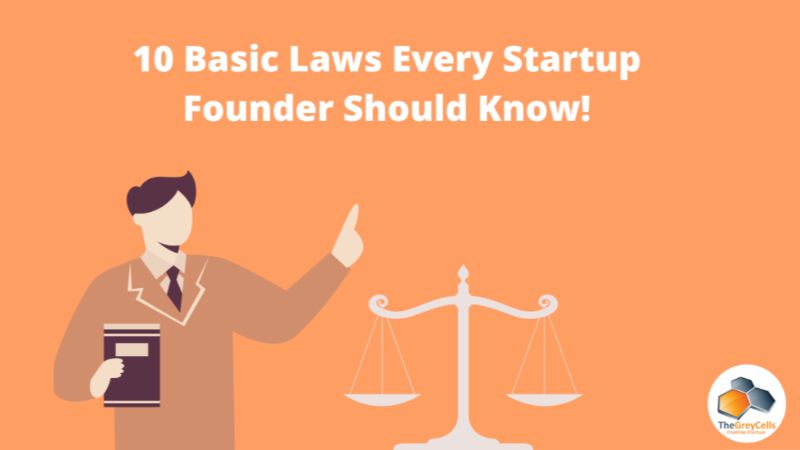“Success in business requires discipline, hard work, and adherence to principles.” — John Carmack
Having a basic understanding of legal requirements is essential for a business, such as fundamental laws, HR policies, and some agreements. A small mistake in the legal framework may destroy the image of your company. Therefore, it is important to learn the basic laws revolving around your business.
Before moving to the laws, let’s discover the importance of understanding these laws in a startup journey.
Why Should a Startup Founder Understand These Laws?
Every business needs law and order to avoid any unacceptable behavior, to ensure stability, and a proper mechanism for its smooth running. A company can hire a lawyer anytime but they are the experts who are needed during legal matters.
They can only advise entrepreneurs and form documents. In the end, entrepreneurs have to make the final decision and asses the situation between their clients, vendors, or customers.
Sometimes, a startup cannot afford a lawyer. Therefore, a founder should prepare himself/herself to handle such legal issues by having basic knowledge regarding law and agreements.

Importance of learning these laws:
- To avoid any future disputes over patents or agreements between clients or employees
- A founder can save money by resolving legal issues with their knowledge
- Laws provide legal recognition to a startup and act as its backbone.
- To make better judgments wherever law and regulation are applicable.

Laws that Every Startup Founder Should Know
1. Formalizing legal business structure
As a startup founder, you must decide the nature and type of your business. To decide this, one should be clear with their goals and vision. There are generally four types of business structure:
- Sole proprietorship
- Partnership / Limited liability partnership (LLP)
- Public Limited
- Private Limited
After deciding on the company’s incorporation, understand the registration process, legal status, member liability, taxation, annual billings., etc. All these aspects are different according to the types of business structure.Generally, a startup considers a private limited company as it helps them in raising external funds for their business.
Read More: SWOT Analysis
2. Co-founder’s or Founders/Shareholders Agreement
Preparing a founder and co-founder/shareholder’s agreement is crucial for a startup to define the roles and responsibilities of each member, exit/operative clauses, and other executive functions in a company.
This agreement also mentions the number of shares each member would have. There are a few clauses such as no founder should be in direct contact with any of the competitors, restrictions imposed on share acquisitions and transfers., etc.
These agreements are made to avoid any disputes or confusion between founders and shareholders.
Read More: How to find a co-founder for your startup?
|
|
Thank you for Signing Up |


3. Accounting and Taxation laws
Taxes are an integral part of any startup, and different industries comply with different tax laws. Thus, every new entrepreneur needs to be well-versed in accounting and taxation laws.
There are certain laws such as state tax, central tax, transportation tax, commodity tax., etc that a founder should know. Governments in different countries introduce tax exemptions to boost the startup’s growth.
For instance, the Government of India has exempted tax for partnership firms, LLP, or private limited company which is not more than 7 years old (10 years for biotech) and whose turnover is not more than 5 crores.
A startup founder can avail of many benefits regarding taxation if they are updated on current tax laws. They should also maintain accounting books properly to identify the profit or loss of their firm and the reason behind it. These books also help in applying for loans as well as provide safety against any accounting discrepancies.
4. Labour Laws and Codes
A startup should have a well-defined employee policy to hire talents and provide non-toxic work culture. These laws help in boosting employees’ morale and productivity in your firm and protect you from wrong suits or defamation charges. Labour laws are generally related to the following aspects:
- Minimum wages
- Gratuity,
- PF payment,
- Work-life balance,
- Maternity benefits,
- Workplace harassment,
- Bonus,
- Leave policy (sick leave, casual leave., etc)
There are certain laws under the Government of India such as The Industrial Disputes Act (1947), The Contract Labour (Regulation and Abolition) Act (1970), The Industrial Employment (Standing Orders) Act, 1946., etc to ensure proper treatment of its workforce.A startup in India can even get an exemption from the labor inspection by providing self-declaration under 9 statutes.
5. Laws Related to Licenses and Registrations
Before starting your business, a founder should understand the type of license required to avoid any legal battles. These licenses are different according to the nature or structure of your business.
Licenses such as the ‘Shop and Establishment Act’ is needed for new businesses. For an e-commerce company, VAT registration, service tax registration, professional registrations., etc are required.
6. Intellectual Property(IP) Rights
While launching any innovative product or service, you need to patent it or build a trademark to prevent others from using it. It gives you exclusive rights and protects your idea from being stolen or copied. Patents, Trademarks, and Designs come under the protection of intellectual property (IP) rights.
The panel of facilitators at the “Controller General of patents, trademarks, and designs” assists you in filing out the patent application.
There are schemes launched in different countries for issuing such rights. For instance, Startup India Programme has a scheme called ‘Startups Intellectual Property Protection (SIPP)’ to protect and commercialize new businesses.
Read More: Interesting Startup Statistics

THE 7-STEP STARTUP SUCCESS FORMULA - DR. ANU KHANCHANDANI
Every entrepreneur’s journey is a mix of failures and successes. The probability of failure is higher, however, there is a way to grow and keep growing until you build a successful startup. This book is one such guide to help you with 7 formulas for your success.
7. Contract management such as Non-disclosure agreement (NDA), Stock Purchase Agreement
Contracts are essential for the smooth running of an enterprise as it binds agreements in legal form. According to the Indian Contract Act, 1972, all agreements will be considered contracts that are made with lawful consideration for a lawful object and are not declared void.
A startup founder should enter into contracts with clients, vendors, or employees to reduce any kind of risk in the future. Contracts such as a Non-disclosure agreement (NDA) is a legal binding between two or more parties to keep sensitive information confidential. Some pieces of information are not meant to be disclosed to outsiders.
A startup has three types of NDA to select from:
- Unilateral non-disclosure agreement
- Bilateral non-disclosure agreement
- Multilateral non-disclosure agreement
A stock purchase agreement is a legal document in terms of the stock acquisition which includes details of price and number of shares being purchased, date of sale.,etc
8. Business insurance policy
This insurance policy is a kind of savior for any startup. It protects your business from financial loss caused by any unexpected situation like flood, fire, or theft. It is necessary to have insurance for your business as it forms credibility in the market, and certain Government agencies or clients don’t want to work if your company is not insured. A few business policies are given below that a startup should consider:
- Professional liability insurance
- General liability insurance
- Workers’ compensation insurance
- Commercial property insurance
A startup founder should understand the amount of coverage they need and then avail of these policies.
9. I.T. Laws
The advancement in technology has also increased certain threats and risks in the IT sector. Thus, knowing these laws has become mandatory for startups involved in online business or trading through online platforms.
Laws and regulations regarding e-contracts, cloud computing, and digital signatures protect your data and privacy from potential hackers.
10. Legal rules to winding down or exit
No one would think about closing their business even before stating it. But there is no harm in preparing for the worst and hoping for the best as the winding-up process is complicated and involves certain procedures.It has to be done through proper planning and in a systematic way.
There are three ways to shut down a business.
- Quick exit mode
- Court or tribunal route
- Voluntary closing of the business
Out of these three, the Quick exit mode is a better option as it involves less time and cost. In the case of the court or tribunal route, it is not often advisable as it includes having various meetings with the stakeholders and long court hours. In the last method, creditors and shareholders must be on the same page to proceed with this route.
Conclusion
Laws and regulations are made for the people only to ease the process of living. They are an essential part of any kind of business.
Thus, every startup founder should try to have a basic understanding of these laws beforehand for avoiding any major problems later.
One of the best methods to secure a company is by having any professional member or legal counsel by your side who can advise and monitor you in these situations.
Read: Top FAQs for Startup

With over two decades of experience in the software technology arena, having worked in multinational and SME companies in India, USA and Singapore in the capacity of programmer to CTO – I felt now was a good time to give back to the world what I have learnt in this journey. Even if it ends up benefitting a few of my readers by giving them insight or solving a technical issue, I think I will have achieved my mission!


